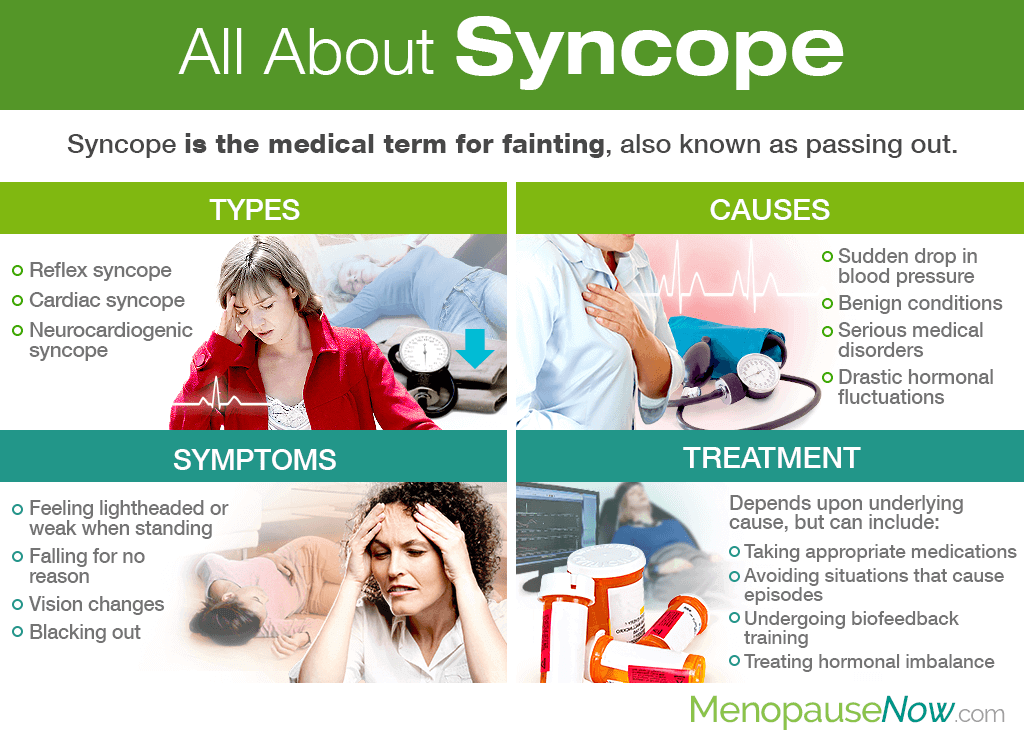While some women know that the medical term for fainting is syncope, there is much to learn about syncope in order to have a complete understanding of this complex condition and exactly what it entails. Continue reading to learn all about syncope, including symptoms, causes, treatments, and more.
Define Syncope
Syncope is the medical term for fainting, also known as passing out. It is a common condition that affects up to 3.5 percent of all women and men, increasing to 6 percent for those over the age of 75.
It is important to differentiate syncope from dizziness or pre-syncope, feeling of lightheadedness. The latter two usually refer to changes in vision, balance, and the perception of the environment without loss of consciousness.
Types of Syncope

There are various types of syncope as categorized by their causes, including:
Reflex syncope. This type of syncope is known as the “common faint.” It can be triggered by events (vasovagal syncope) - such as emotional stress, trauma, the sight of blood or needles, sudden fear, etc. - or immediately after urination, defecation, coughing, laughing, and more.
Cardiac syncope. Cardiac syncope is caused by heart conditions as well as certain types of hypotension, or low blood pressure. It is quite serious as it can increase the risk of sudden cardiac death.
Neurocardiogenic syncope (NCS). Neurocardiogenic syncope is also called neutrally mediated syncope (NMS). It is characterized by the pooling of blood in the extremities, hypotension, and a slow heart rate upon standing.
Syncope Symptoms

The most common symptoms of syncope include:
- Feeling drowsy
- Feeling weak when standing
- Falling for no reason
- Feeling lightheaded
- Blacking out
- Fainting after eating or exercising
- Vision changes
- Headaches
- Feeling dizzy
Anyone who feels as if a syncopal episode is forthcoming - lightheaded with nausea and heart palpitations - should sit or lie down immediately with legs elevated. This may prevent loss of consciousness.
Syncope Causes

Syncope is caused when there is a sudden drop in blood pressure, and the heart doesn't pump sufficient amounts of oxygen to the brain. While it can be caused by an underlying medical condition, syncope can also be benign.
Benign conditions that can cause syncope include exhaustion, dehydration, overheating, heavy sweating, and the pooling of blood in the legs from sudden changes in body position.
On the other hand, serious medical disorders that can cause syncope include heart conditions - such as those that obstruct blood flow; tachycardia, a fast heart rate; or bradycardia, a slow heart rate - or those that affect the nervous system.
For menopausal women, syncope could be caused by drastic hormonal fluctuations taking place in their bodies are the ovaries wind down reproductive functions. These fluctuations affect blood pressure levels, blood vessels, and circulation, leading to dizziness and possible syncopal episodes.
Syncope Diagnosis
Women of all ages who suffer from repeat syncopal episodes will be referred to a specialist for a complete evaluation that will start with reviewing a patient's medical history - with detailed questions about syncope symptoms, frequency, etc. - followed by a physical exam.
Then, women may have to undergo certain diagnostic tests to determine the exact cause of syncopal episodes. These tests check heart health, blood volume and flow, and - for menopausal women - reproductive hormone levels.
Testing can involve the use of electrocardiograms (EKGs or ECGs), exercise stress tests, tilt tables, blood volume determination tests, and more.
Syncope Treatment

Syncope treatment will depend upon the underlying cause of the condition and the results of the evaluation and testing. Generally, treatment is focused on preventing further syncopal episodes from happening.
As such, several treatment measures could include:
Taking appropriate medications to manage the syncope cause.
Avoiding or changing situations that trigger syncopal episodes.
Controlling a fast heart rate with biofeedback training.
Undergoing appropriate surgery to further regulate one's heart rate, such as the insertion of a pacemaker or implantable cardiac defibrillator (ICD).
For menopausal women whose syncope is most likely result of hormonal imbalance, pursuing menopause symptom treatments that foster endocrine system health should prevent further syncopal episodes from occurring.
By enacting non-invasive approaches through lifestyle changes - that include an optimized diet, regular exercise, and healthy habits - alongside alternative medicine proven to combat hormonal imbalance, it is possible to find long-term relief from syncope once and for all.
Sources
- American Heart Association. (2017). Syncope (Fainting). Retrieved May 7, 2019, from https://www.heart.org/en/health-topics/arrhythmia/symptoms-diagnosis--monitoring-of-arrhythmia/syncope-fainting
- Auckland Heart Group. (n.d.). Presyncope/Syncope. Retrieved May 7, 2019, from https://www.heartgroup.co.nz/Patient+Information/Cardiac+Conditions/Adult/Adults+-+PresyncopeSyncope.html
- Cleveland Clinic. (2019). Syncope: Overview | Diagnosis and Tests | Management and Treatment. Retrieved May 7, 2019, from https://my.clevelandclinic.org/health/diseases/17536-syncope | https://my.clevelandclinic.org/health/diseases/17536-syncope/diagnosis-and-tests | https://my.clevelandclinic.org/health/diseases/17536-syncope/management-and-treatment
- Dysautonomia International. (n.d.). Summary of Syncopal Disorders. Retrieved May 7, 2019, from http://www.dysautonomiainternational.org/pdf/SummaryOfSyncopalDisorders.pdf
- Heart Rhythm Society. (n.d.). Treatment for Syncope. Retrieved May 7, 2019, from https://www.hrsonline.org/Patient-Resources/Symptoms-Diagnosis/Fainting/Treatment-for-Syncope
- Mayo Clinic. (2016). Women's Wellness: Perimenopause symptoms. Retrieved May 7, 2019, from https://newsnetwork.mayoclinic.org/discussion/perimenopause-symptoms-occur-as-womens-bodies-transition/

